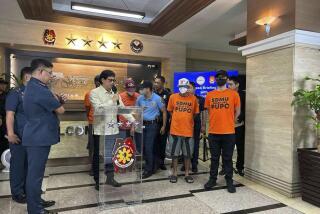Anger high in Hong Kong after Philippine bus hijacking
- Share via
Reporting from Hong Kong — The bodies of eight Hong Kong tourists killed in a bus hijacking siege in the Philippines were returned home Wednesday on a government-chartered flight as the city of 7 million pulsated with anger and frustration.
Henry Tang, Hong Kong’s chief secretary for administration, placed white wreaths on the caskets as bagpipers played. Several survivors of Monday’s hostage drama and family members of the slain victims were also on the plane home. One seriously injured teenager remained in a Manila hospital, and a female gunshot victim was to be transported home on a separate medical flight.
A large number of Filipinos live in Hong Kong, many of them working as live-in maids and nannies. Concerned about possible acts of retribution, Hong Kong Chief Executive Donald Tsang recorded video messages urging calm.
“This is a moment that we all have to act sensibly and to behave in a civil manner. I understand the strong feelings and sentiments within the community,” Tsang said in a Facebook video. “But I also know for sure that the nearly 200,000 Filipino nationals who are working in Hong Kong, who are settled in Hong Kong, feel exactly the same way as everybody else about this incident.”
In Manila, authorities reportedly suspended four police officers who led the assault to free the passengers on the bus, an operation widely denounced as botched and amateurish.
The hijacking of the bus with 21 Hong Kong tourists was carried out by a disgruntled ex-police officer who demanded to be reinstated to his job. Several hours of the hostage drama played out live on television, transfixing Hong Kong. In shops, offices, restaurants and homes, people sat riveted to TV sets as the botched rescue effort unfolded.
Over the course of the day, several passengers managed to escape the bus, but eight captives and the gunman were killed when police ultimately stormed the vehicle after negotiations broke down.
Philippine authorities, who have launched an investigation of the tragedy, have come under fierce criticism in Hong Kong, a former British colony that is now a special administrative region of China. The city’s legislature called a special session on the matter, and on Wednesday, one Hong Kong political party asked authorities in Beijing to ensure that Hong Kong representatives are involved in the Philippine inquiry.
Lau Kong-wah, vice chairman of the Democratic Alliance for the Betterment of Hong Kong, said his party was concerned about the fairness of the investigation.
Flags flew at half-staff for a second day here as tens of thousands of residents, some in tears, visited community centers to sign condolence books for the families of the victims. Chief Executive Tsang called for three minutes of public silence Thursday morning.
Stephen Chan, who turned out Wednesday night to sign a book at a community center in the city’s Happy Valley district, criticized the failed rescue and Philippine President Benigno Aquino III’s response. Aquino did not speak with Tsang by phone until the day after the hostages were killed.
“The Philippine government’s response was very bad,” Chan said. “And the president is acting very arrogant. He is not really even apologizing.”
Chan said it would be unfair for Hong Kong residents to express hatred toward Filipino workers in the city in the wake of the hostage fiasco, but he expressed concern that the atmosphere could become tense. “I’m worried that this incident will raise racial discrimination,” he said.
Some said the tragedy pointed up Hong Kong’s political impotence despite its status as a world financial center.
“The Hong Kong government needs a bigger international presence,” said Harriet Kwan, another resident who came to sign a condolence book. “We used to rely on the British, until 1997, and now we rely on China. But I don’t think the Chinese government will do anything that meets my expectations. If this had been British citizens, or Canadian citizens, I’m sure much more would have been done.”
More to Read
Sign up for Essential California
The most important California stories and recommendations in your inbox every morning.
You may occasionally receive promotional content from the Los Angeles Times.














